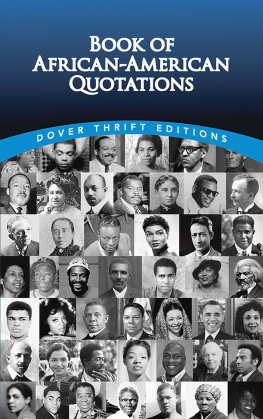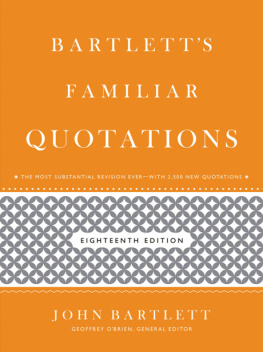In accordance with the U.S. Copyright Act of 1976, the scanning, uploading, and electronic sharing of any part of this book without the permission of the publisher constitute unlawful piracy and theft of the authors intellectual property. If you would like to use material from the book (other than for review purposes), prior written permission must be obtained by contacting the publisher at permissions@hbgusa.com. Thank you for your support of the authors rights.


Ive listened to and delivered enough speeches in my life to know how handy
Bartletts Familiar Quotations can be to anyone hoping to inspire others with the collective wisdom of those whove gone before: their insights, humor, irony, and wit; their doubts, fears, and frustrations; their observations about the nobility and frailties of the human condition; and their beliefs about the purpose of the life well-lived and even the possibilities and prospects of a life beyond this one. Sometimes
Bartletts introduces us to nuggets of thoughts of writers weve never heard of, or it reminds us of the brilliance of those weve read long ago, whose canonical status we take for granted but whose thinking about a particular subject we either missed or have forgotten.
The most compelling quotations from the works of our most original thinkers can, in just a few words or lines, move us in profound ways, and (in quite a mysterious and uncanny process) name feelings and thoughts that are, paradoxically, deeply familiar to us yet still inchoate, lacking in formideas, we realize as soon as we read them clothed in expressive language, that we have felt, even though we hadnt found a way to give voice to them. Encountering these ideas, digested for us in reference works like Bartletts, yields the sheer pleasure of recognition of a shared humanity, through the realization that we are not alone in either how we view the world or our existence in that world. Ideas such as these, rendered so easily accessible by a careful and thoughtful editor, can explain and even reshape our understanding of the world in a single moment of clarity, beauty, epiphany. And when we repeat them, when we make them part of ourselves and our work, we give them life in multiple dimensions: then and now, here and there, point and counterpoint, first- and second-hand. A precious few quotations, the ones we know by heart, alter the landscape so fundamentally that attribution, though richly deserved (and required), no longer even seems necessary. E. B. B.
Du Bois, the poet Langston Hughes, the novelist Zora Neale Hurston, the Reverend Dr. Martin Luther King, Jr., and President Barack Obama. And through the familiarity bred of repetition, these words are part of our common culture. Reference works like Bartletts are tools that shape our common culture, the sum total of thoughtful reflection that, collectively, we all share and to which we are all heir, regardless of the nationality, gender, or ethnicity of the authors, the time or place when their words were first uttered or written, or the conditions (sometimes dire) that spawned them. The wisdom of the human community is the common property of us all. As a literary critic and a historian of the African and African American intellectual traditions, I can be a fanatic about recording lost and familiar quotations.
As a person who loves archival research and preserving the achievements of people of color by editing encyclopedias, anthologies, and biographical dictionaries, I am particularly grateful to and admiring of Retha Powers for her magnificent achievement in compiling and editing this impressively researched and documented collection of the finest thought produced by writers throughout the African diaspora (as well as citations from key ancient, classical African texts and the King James Bible, which has long been the silent second text of so very much of black literature and oratory). Bartletts Familiar Black Quotations is the first of its kind in the Bartletts family, and its enormous historical significance derives from what it signifies about the longer journey in thought and feeling that its pages so invitingly contain. When my fellow Cantabridgian John Bartlett printed the first private edition of his Collection of Familiar Quotations in 1855, race-based slavery in America was still legal in 15 states and the District of Columbia, and many slaveholders, mindful of laws forbidding their property from learning to read and write, would have punished them (or worse) for even looking at a book like Bartletts, out of fear that it would talk back to them (a recurring trope in the first half-dozen slave narratives)and thus incite them to think for themselves, to recognize their common humanity with their putative owners, and then to run away or revolt. The leading black abolitionist of his day, Frederick Douglass, himself an ex-slave, wrote in his second slave narrative, My Bondage and My Freedom, in the very same year Bartlett published his book of quotations, that his former master had warned his wife not to teach the young Douglass or any other slave to read the Bible: learning would do him no good, his master warned, and even worse probably, a great deal of harmmaking him disconsolate and unhappy. He was right, Douglass later explained in his own book; for once he had learned to read, in secret, he had penetrated the secret of all slavery and oppression, and had ascertained their true foundation to be in the pride, the power and the avarice of man. In other words, learning to read freed the slave-child long before he managed to escape to the North and become free, and the one book that had inspired him more than any other was The Columbian Orator, a book of political essays, dialogues, and quotations.
For Frederick Douglass and countless slaves and ex-slaves, language was power, literal power that they used to comprehend, critique, and ultimately dismantle the system that for centuries had chained them and their families, the system that was constructed in every meaningful way to convince human beings that they were, by nature, meant to be chattel slaves. Not even in the free states of the North would it have been easy for a black person to gain access to a book of such canonical importance as Bartletts; indeed, in John Bartletts own home state of Massachusetts, several decades before, the first African American to publish a book of poetry, Phillis Wheatley, had had to submit to examination by the leading lights of Boston to ascertain that the poems she had written were not mere quotations of others work but her own original creations, the creations of a rational fellow human being. I sit with Shakespeare, and he winces not, W. E. B. at Harvard, wrote in The Souls of Black Folk (1903) during the height of the Jim Crow era, when African Americans, even when they could attend school, found it extremely difficult to gain access to textbooks or canonical literature in separate, poorly funded, and extremely unequal institutions. at Harvard, wrote in The Souls of Black Folk (1903) during the height of the Jim Crow era, when African Americans, even when they could attend school, found it extremely difficult to gain access to textbooks or canonical literature in separate, poorly funded, and extremely unequal institutions.







 Ive listened to and delivered enough speeches in my life to know how handy Bartletts Familiar Quotations can be to anyone hoping to inspire others with the collective wisdom of those whove gone before: their insights, humor, irony, and wit; their doubts, fears, and frustrations; their observations about the nobility and frailties of the human condition; and their beliefs about the purpose of the life well-lived and even the possibilities and prospects of a life beyond this one. Sometimes Bartletts introduces us to nuggets of thoughts of writers weve never heard of, or it reminds us of the brilliance of those weve read long ago, whose canonical status we take for granted but whose thinking about a particular subject we either missed or have forgotten.
Ive listened to and delivered enough speeches in my life to know how handy Bartletts Familiar Quotations can be to anyone hoping to inspire others with the collective wisdom of those whove gone before: their insights, humor, irony, and wit; their doubts, fears, and frustrations; their observations about the nobility and frailties of the human condition; and their beliefs about the purpose of the life well-lived and even the possibilities and prospects of a life beyond this one. Sometimes Bartletts introduces us to nuggets of thoughts of writers weve never heard of, or it reminds us of the brilliance of those weve read long ago, whose canonical status we take for granted but whose thinking about a particular subject we either missed or have forgotten.